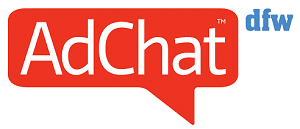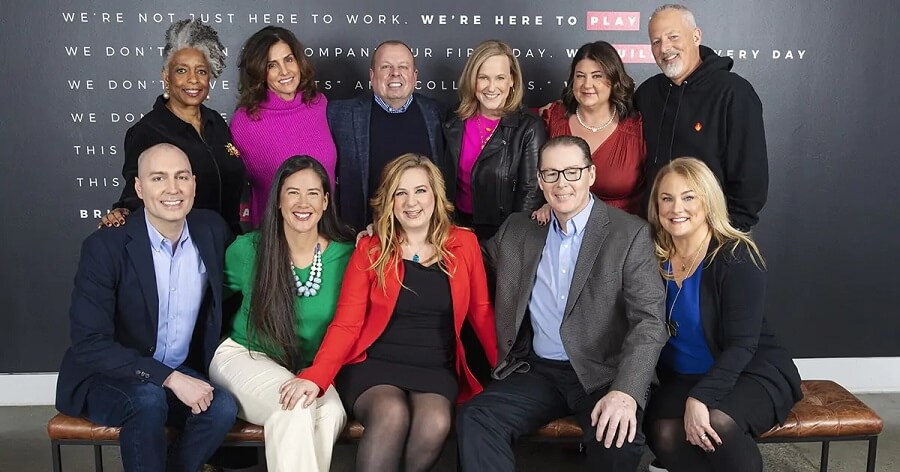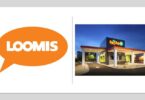(Back row, l. to r.) E.T. Franklin, chief strategy and cultural fluency officer; Maria Rose Pollara, chief talent officer; Chris Boothe, chief operating officer, Publicis Media; Sarah Kramer, chief executive officer; Kerry Hemmerich, chief client and operating officer; Scott Hess, chief marketing officer. (Front row, l. to r.) David Calkins, chief growth officer; Liam O’Neill, president; Lisa Giacosa, chief investment officer; Tom McElroy, chief financial officer; Kathryn Dillon, president
Publicis Media, with offices in Dallas-Ft. Worth, delivered an astonishing year of new business in 2021.
Its agencies—Spark Foundry, Zenith and Starcom—reeled in some of the biggest fish, as the group collectively landed Walmart and automaker Stellantis. Zenith snagged over a billion dollars in managed media spend for pharmaceutical giant Eli Lilly and Inspire Brands’ Dunkin’ and Arby’s, while Starcom ended 2021 by wrestling McDonald’s $700 million account away from Omnicom.
In total, Publicis Media won nearly $7 billion in new business, according to COMvergence’s 2021 new business report. When adding the accounts the group retained and lost, the net value of Publicis Media’s new business ranked first among the industry’s media groups.
At the center of that charge stands Spark Foundry and its 16 new business wins. In fact, no media agency won more accounts last year than Adweek’s 2022 U.S. Media Agency of the Year. The agency has made significant investments in capabilities that clients desperately need guidance in, such as Web3 and commerce, and in understanding how to effectively put data to use.
“We have the spirit of a startup and the soul of a powerhouse,” says Spark Foundry CEO Sarah Kramer. “That permeates through our behaviors and attitudes, and it’s what allowed us to endure the pandemic in the way that we did to come out with such a strong 2021.”
Spark Foundry’s ingredients for new business success are simple: People. Power. Process.
Kramer says two wins in particular—KFC and Meta—best represent Spark’s pitch-winning recipe. Clients and consultants have told David Calkins, Spark Foundry’s chief growth officer, that its people are its greatest strength.
“Having a diverse pitch team made up of different backgrounds, skill sets and perspectives is so incredibly important because it elevates our collective thinking for more strategic business-driving solutions,” Calkins says.
Spark Foundry’s power comes from the Power of One strategy: When the agency pitches, clients understand there’s a massive agency network waiting in the wings, should they need services beyond what Spark can offer. And in a new age of consolidation, Publicis Groupe built its framework for this future.
Due to the scope of the agency’s responsibilities for Meta, the brand will likely utilize every capability Spark has to offer.
KFC saw that immediately when the agency delivered what Chavez describes as unmatched consumer insights, which the agency was able to “bring to life and culture through a media plan and media buy” that he says were “very, very impressive.”
New capabilities
Spark also attracted so much client interest because of its forethought in building expertise in areas where marketers were likely to have significant knowledge gaps.
While Spark Foundry excelled at the more traditional components of a media review and impressed Meta with its enthusiasm for the business, the agency also showed a keen ability to help the client understand consumers’ needs in the metaverse.
Calkins says the agency has a team dedicated to Web3, enabling it to educate clients on activating in a “way that’s strategic and thoughtful for their business challenges and … more importantly, their consumer.”
For example, Spark is working with Meta to determine what consumers will find most interesting in the metaverse and virtual reality.
In addition to helping transform Meta’s business, Spark Foundry has helped existing clients make their first forays into Web3 and NFTs. Kramer says the agency is evaluating ways to create monetization opportunities for brands in the metaverse and helping them not just have one-off executions, but to use the metaverse as “an ongoing new development in their innovation pipeline.”









